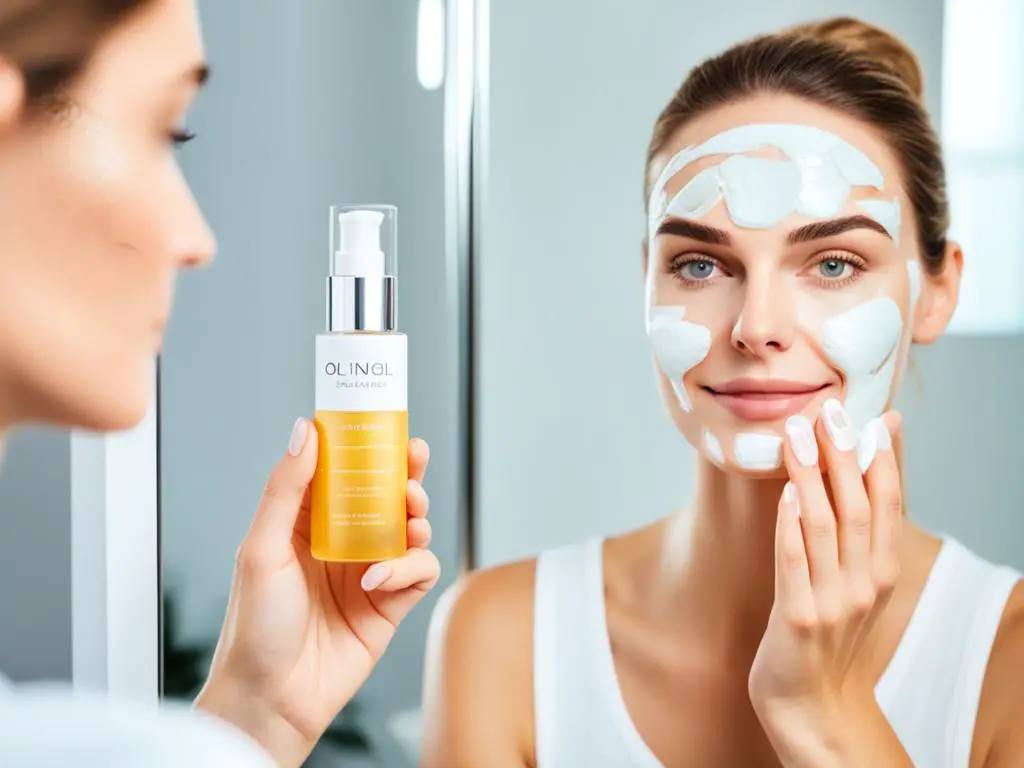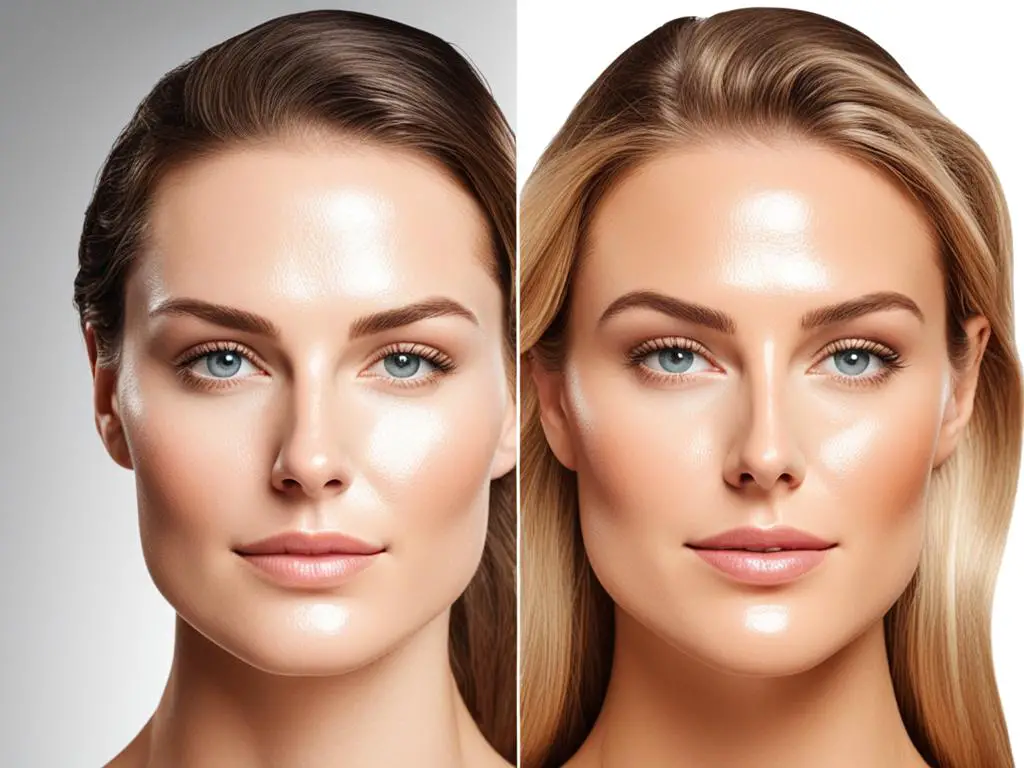Welcome to our in-depth guide on the difference between dewy skin and oily skin. Many people strive for a healthy, radiant glow, but it can sometimes be challenging to strike the right balance between a dewy complexion and excessive shine. In this article, we’ll explore the characteristics of dewy and oily skin, understanding how to achieve each, managing oil production, and choosing the right skincare products.
Key Takeaways:
- Dewy skin and oily skin have different characteristics, including texture, hydration levels, and shine.
- Achieving dewy skin involves maintaining proper hydration, using specific skincare products, and following appropriate techniques.
- To manage oily skin, it’s essential to establish a skincare routine that controls excess oil production and reduces shine.
- Both dewy and oily skin types require a well-balanced approach to moisture and oil to maintain a healthy complexion.
- Choosing the right skincare products tailored to your skin type is crucial for achieving your desired glow.
Understanding Dewy Skin
Dewy skin is a coveted complexion that exudes a healthy, radiant glow. Achieving this coveted look requires a combination of proper hydration, effective skincare products, and techniques that promote a dewy complexion.
One of the key elements to achieving dewy skin is hydration. Ensuring your skin is well-hydrated is essential for a radiant and plump appearance. Incorporating a moisturizer into your skincare routine can help lock in moisture and promote a dewy complexion. Look for lightweight, non-comedogenic formulas that are specifically designed for achieving dewy skin.
When it comes to skincare products for dewy skin, there are a few key ingredients to look out for. Hyaluronic acid is a hydrating powerhouse that can attract and retain moisture in the skin, resulting in a plump and dewy appearance. Glycerin is another humectant that helps to draw moisture to the skin’s surface, enhancing its natural glow.
Another important aspect of achieving dewy skin is the proper application techniques. Using a facial oil can help to impart a luminous sheen to the skin. Simply warm a few drops of oil between your palms and gently press it onto your skin for a natural glow. Additionally, using a highlighter on the high points of your face, such as the cheekbones, brow bone, and the bridge of the nose, can add an extra touch of radiance.
Pro Tip: Start with a well-prepped canvas by exfoliating regularly to remove dead skin cells and maximize the absorption of hydrating products.
To achieve dewy skin, it’s important to adopt a comprehensive approach to skincare that focuses on both internal and external factors. Ensuring you drink plenty of water and consume a balanced diet rich in fruits, vegetables, and healthy fats can contribute to a radiant complexion.

| Skincare Products for Dewy Skin | Key Benefits |
|---|---|
| Hydrating Moisturizers | Locks in moisture and promotes a dewy complexion |
| Hyaluronic Acid Serums | Attracts and retains moisture, resulting in a plump and dewy appearance |
| Glow-enhancing Facial Oils | Adds a luminous sheen to the skin for a natural glow |
| Illuminating Highlighters | Enhances the high points of the face for an extra touch of radiance |
By understanding the key elements of dewy skin and incorporating the right products and techniques into your skincare routine, you can achieve a radiant and glowing complexion that exudes a healthy luminosity.
Managing Oily Skin
Oily skin can be a challenge to manage, but with the right tips and strategies, you can control oil production and reduce shine. In this section, we will discuss effective skincare routines, recommended products, and lifestyle changes that can help you manage oily skin.
A Consistent Skincare Routine
A well-designed skincare routine is crucial for managing oily skin. Here are some tips to keep in mind:
- Start with a gentle cleanser specifically formulated for oily skin to remove excess oil without stripping away essential moisture.
- Use an alcohol-free toner to balance the skin’s pH levels and minimize the appearance of pores.
- Choose lightweight, oil-free moisturizers that provide hydration without adding extra shine.
- Consider incorporating targeted treatments like serums or spot treatments to address specific concerns such as acne or congestion.
- Don’t forget to apply sunscreen every day to protect your skin from harmful UV rays.
Controlling Oil Production
Controlling oil production is key to managing oily skin. Here are some strategies to help keep oiliness at bay:
- Avoid overwashing your face, as it can lead to increased oil production. Stick to cleansing your face twice a day, morning and evening.
- Exfoliate regularly to remove dead skin cells and unclog pores. Look for gentle exfoliants that won’t irritate your skin.
- Use oil-absorbing or mattifying products, such as primers or blotting papers, throughout the day to reduce shine.
- Avoid heavy or greasy makeup products that can clog pores and exacerbate oiliness.
- Consider incorporating a clay mask into your skincare routine once or twice a week to help absorb excess oil.
By following these tips and strategies, you can effectively manage oily skin and achieve a healthier, more balanced complexion.

“My skin used to be extremely oily and prone to breakouts. After adopting a consistent skincare routine and making a few lifestyle changes, I’ve seen a significant improvement. My skin is now much more balanced and less shiny.” – Emma, skincare enthusiast
Key Differences Between Dewy and Oily Skin
When it comes to achieving a radiant complexion, understanding the difference between dewy skin and oily skin is crucial. While both may appear to have a similar shine, there are specific factors that set them apart. Let’s dive deeper into the contrasting characteristics of dewy and oily skin.
Texture
The texture of your skin plays a significant role in determining whether it leans towards dewy or oily. Dewy skin has a smooth and supple texture, with a soft and plump appearance. On the other hand, oily skin tends to have a thicker and greasier texture, often accompanied by enlarged pores.
Hydration Levels
Hydration is another differentiating factor between dewy and oily skin. Dewy skin is well-hydrated and maintains a healthy moisture balance, resulting in a natural glow. Oily skin, on the contrary, produces excess sebum, leading to a greasy complexion that may feel oily to the touch.
Appearance of Shine
The appearance of shine is where the most noticeable difference lies between dewy and oily skin. Dewy skin has a subtle sheen, giving it a radiant and illuminated look. This glow is often achieved through proper hydration and skincare practices. Conversely, oily skin reflects excess shine, which can make the face appear greasy and even contribute to breakouts.
Tip: To differentiate between dewy and oily skin, pay attention to the texture, hydration levels, and the type of shine present on your skin.
| Dewy Skin | Oily Skin |
|---|---|
| Smooth and supple texture | Thicker and greasier texture |
| Well-hydrated with a natural glow | Excess sebum production and greasy complexion |
| Subtle sheen for a radiant look | Visible shine, often greasy in appearance |

Understanding the key differences between dewy skin and oily skin is essential in tailoring a skincare routine that addresses your specific needs. Whether it’s enhancing your natural radiance or managing excess shine, finding the right balance for your skin type is the key to a healthy and glowing complexion.
Achieving a Healthy Glow
When it comes to achieving a healthy, radiant glow, a consistent skincare routine and nourishing your skin from within are key. Regardless of your skin type, implementing these tips will help you achieve the coveted luminosity you desire.
Skincare Practices for Radiant Skin
Creating a skincare routine that focuses on nourishing and hydrating your skin is essential for achieving a healthy glow. Here are some tips to incorporate into your daily regimen:
- Start with a gentle cleanser to remove dirt, oil, and impurities without stripping your skin.
- Follow with a hydrating toner to balance and prep your skin for the next steps.
- Choose a lightweight moisturizer that provides ample hydration without leaving a greasy residue.
- Consider adding a serum or facial oil rich in antioxidants to boost radiance and protect against environmental stressors.
- Don’t forget to apply SPF every day to shield your skin from harmful UV rays.
Nourishing Your Skin from Within
A healthy, radiant complexion also starts with what you put into your body. Here are some tips for promoting skin health from within:
- Stay hydrated by drinking plenty of water throughout the day to support skin hydration and overall health.
- Incorporate antioxidant-rich foods into your diet, such as berries, leafy greens, and nuts, to help combat free radicals and promote skin radiance.
- Include foods high in essential fatty acids, like salmon and avocados, to nourish and strengthen your skin barrier.
- Limit your intake of processed foods and sugary treats, as they can contribute to inflammation and dullness.
“Radiant skin is a reflection of overall well-being and self-care.”
– Dr. Emma Brown, Dermatologist
Remember, achieving a healthy glow is a journey that requires consistency and patience. By following these tips for skincare practices and nourishing your skin from within, you can enhance your natural radiance and attain a luminous complexion.
Balancing Moisture and Oil
Managing skin moisture and oil is essential for maintaining a healthy and balanced complexion. Whether you have dewy or oily skin, finding the right skincare routine and products can help you achieve and maintain optimal skin health.
To manage moisture and oil levels, it’s important to incorporate hydrating products into your skincare routine. Look for moisturizers and serums that are lightweight and non-comedogenic, as they will provide essential hydration without clogging pores. Hyaluronic acid and glycerin are excellent ingredients to look for as they attract and retain moisture in the skin.
Proper cleansing techniques also play a significant role in managing skin moisture and oil. Avoid using harsh cleansers that can strip away natural oils, as this can lead to dryness and trigger the skin to produce more oil. Opt for gentle cleansers that effectively remove impurities without disrupting the skin’s natural balance.
Exfoliation is another important step in balancing moisture and oil in the skin. Regular exfoliation helps to remove dead skin cells and unclog pores, allowing for better absorption of hydrating products. However, be mindful not to over-exfoliate, as this can irritate the skin and disrupt its natural moisture barrier. Aim to exfoliate 2-3 times a week using a gentle exfoliant suited for your skin type.
“Finding a balance between moisture and oil is key to maintaining healthy and balanced skin. Incorporate hydrating products, practice proper cleansing techniques, and exfoliate regularly to achieve and maintain a glowing complexion.” – Dr. Michelle Lee, Dermatologist
Tips for Balancing Moisture and Oil:
- Choose skincare products specifically formulated for balanced skin or your skin type.
- Apply a lightweight moisturizer or serum both in the morning and evening.
- Use a gentle cleanser twice a day to remove impurities without stripping the skin.
- Exfoliate 2-3 times a week to remove dead skin cells and unclog pores.
- Avoid using heavy, occlusive moisturizers that can contribute to excess oiliness.
- Consider using oil-absorbing sheets throughout the day to control oiliness.
By implementing these skincare practices and following a consistent routine, you can effectively manage skin moisture and oil, promoting a balanced and radiant complexion.
Choosing the Right Products
When it comes to selecting skincare products, it’s important to consider your specific skin type. Whether you have dewy skin or oily skin, choosing the right products can make a significant difference in maintaining a healthy and radiant complexion.
For those with dewy skin, it’s essential to focus on nourishing and hydrating products that enhance your natural glow. Look for skincare ingredients like hyaluronic acid, glycerin, and vitamin E, which help to retain moisture and provide a luminous effect.
If you have oily skin, on the other hand, opt for products that regulate oil production and mattify the skin. Ingredients such as salicylic acid, witch hazel, and tea tree oil are known for their oil-controlling properties and ability to minimize shine.
To help you make informed choices, here are our top product recommendations for different skin types:
Product Recommendations for Dewy Skin:
| Product | Description |
|---|---|
| 1. CeraVe Hydrating Facial Cleanser | A gentle cleanser that effectively removes impurities without stripping the skin of its natural moisture. |
| 2. The Ordinary Hyaluronic Acid 2% + B5 | A lightweight serum that hydrates and plumps the skin, giving it a dewy and youthful appearance. |
| 3. Glow Recipe Watermelon Glow Sleeping Mask | An overnight mask that deeply hydrates and brightens the skin, leaving it radiant and refreshed in the morning. |
Product Recommendations for Oily Skin:
| Product | Description |
|---|---|
| 1. La Roche-Posay Effaclar Purifying Foaming Gel Cleanser | A clarifying cleanser that removes excess oil and impurities while maintaining the skin’s natural balance. |
| 2. Paula’s Choice Skin Perfecting 2% BHA Liquid Exfoliant | An exfoliating toner that unclogs pores and reduces the appearance of blackheads, leaving the skin smoother and less oily. |
| 3. Neutrogena Oil-Free Moisture Broad Spectrum SPF 35 | A lightweight, oil-free moisturizer with SPF protection that hydrates the skin without adding extra shine. |
Remember, these are just a few recommendations to get you started. As you explore skincare options, pay attention to your skin’s reactions and adjust your routine accordingly. Everyone’s skin is unique, so it may take some trial and error to find the perfect products that work best for you.
By selecting the right skincare products tailored to your specific skin type, you can enhance your natural beauty and achieve the healthy, glowing complexion you desire.
Conclusion
In conclusion, understanding the difference between dewy skin and oily skin is essential for achieving a healthy, glowing complexion. Dewy skin is characterized by a luminous, hydrated appearance, while oily skin tends to produce excess sebum, resulting in shine and potential breakouts.
To achieve dewy skin, it is important to prioritize hydration and use skincare products that nourish and moisturize the skin. On the other hand, managing oily skin requires a targeted approach, including oil-controlling products and techniques that help regulate sebum production.
Regardless of your skin type, maintaining a healthy glow is possible through proper skincare practices. This includes a well-balanced diet, regular cleansing, and exfoliation to remove dead skin cells and promote cellular turnover. Choosing the right skincare products tailored to your specific needs is also crucial for maintaining a radiant complexion.
Remember, dewy skin and oily skin are not opposing forces, but rather variations of skin types that require different approaches to achieve the desired result. By understanding your skin and implementing the right skincare routine, you can achieve the perfect balance and enjoy a healthy, glowing complexion.
